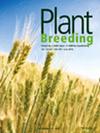环境协变量下Finlay-Wilkinson回归的扩展
IF 1.8
4区 农林科学
Q2 AGRONOMY
引用次数: 0
摘要
Finlay-Wilkinson回归是一种在植物育种和品种试验中常用的基因型-环境相互作用分析方法。它涉及对环境平均值的回归,对环境的生产力进行索引,这是由一系列广泛的环境因素驱动的。越来越多地,使用可观察的环境协变量来明确地描述环境变得可行。因此,人们越来越有兴趣用对这些可观察到的环境协变量的显式回归来取代环境指数。本文综述了这类方法的发展。重点是简化模型,该模型允许通过对合成环境协变量的回归来取代环境指数,这些环境协变量是由大量可观察到的环境协变量组成的线性组合。本文提出了两种新的方法来获得这些合成协变量,它们可以整合到基因型特异性回归模型中,即交叉回归和因子分析法。这种明确的模型的主要优点是,在没有进行试验的新环境中也可以做出预测。使用已发布的数据集来说明所提出的方法。本文章由计算机程序翻译,如有差异,请以英文原文为准。
Extending Finlay–Wilkinson regression with environmental covariates
Finlay–Wilkinson regression is a popular method for analysing genotype–environment interaction in series of plant breeding and variety trials. It involves a regression on the environmental mean, indexing the productivity of an environment, which is driven by a wide array of environmental factors. Increasingly, it is becoming feasible to characterize environments explicitly using observable environmental covariates. Hence, there is mounting interest to replace the environmental index with an explicit regression on such observable environmental covariates. This paper reviews the development of such methods. The focus is on parsimonious models that allow replacing the environmental index by regression on synthetic environmental covariates formed as linear combinations of a larger number of observable environmental covariates. Two new methods are proposed for obtaining such synthetic covariates, which may be integrated into genotype-specific regression models, that is, criss-cross regression and a factor-analytic approach. The main advantage of such explicit modelling is that predictions can be made also for new environments where trials have not been conducted. A published dataset is employed to illustrate the proposed methods.
求助全文
通过发布文献求助,成功后即可免费获取论文全文。
去求助
来源期刊

Plant Breeding
农林科学-农艺学
CiteScore
4.40
自引率
5.00%
发文量
74
审稿时长
3.0 months
期刊介绍:
PLANT BREEDING publishes full-length original manuscripts and review articles on all aspects of plant improvement, breeding methodologies, and genetics to include qualitative and quantitative inheritance and genomics of major crop species. PLANT BREEDING provides readers with cutting-edge information on use of molecular techniques and genomics as they relate to improving gain from selection. Since its subject matter embraces all aspects of crop improvement, its content is sought after by both industry and academia. Fields of interest: Genetics of cultivated plants as well as research in practical plant breeding.
 求助内容:
求助内容: 应助结果提醒方式:
应助结果提醒方式:


